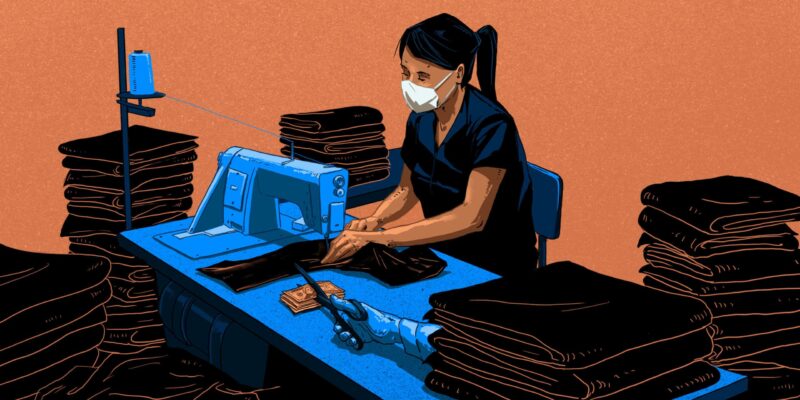This story was published in partnership with Univision and The Associated Press.
Introduction
Subscribe on Google | Apple Podcasts | Spotify | Amazon
Audelia Molina, a Mexican immigrant, was earning 10 cents for every garment she trimmed at a factory in Los Angeles, America’s clothing-assembly capital. Her wage was so meager that she started putting in 11-hour days to drive up production. When she asked for a raise, a supervisor denied her request, so she quit in July 2017 — and turned to a labor-rights attorney to help her file an unpaid-wage complaint with the California Labor Commissioner.
A year later, the state found that Molina was paid, on average, $199 a week, violating overtime law and rules that piece-rate workers earn at least the state’s then $10.50 hourly minimum wage. But Molina’s employer didn’t pay her the almost $23,000 owed, not including attorney fees. Her best option was to apply to a state fund for cheated garment workers, a rare backstop California finances with business registration fees.
It took two more years before Molina received her check. Her former employer still hasn’t reimbursed the state fund, as required.
A 30-year resident of California, Molina got caught in a toxic cycle centuries old: Immigrants perform some of America’s lowest-paying, arduous jobs, and are among those most victimized by employers failing to pay them fairly. Even if they have support to file a lawsuit or a claim — with a state labor agency, as Molina did, or the U.S. Department of Labor — they often settle for less to get money faster or must wait as cases drag on.
“They pay whatever they want to pay,” said Molina, now 58, referring generally to the worst of garment factory employers she’s had over the years. “What interests them,” she said, “is that the work gets done, and fast.”
Just like U.S. citizens, any non-citizen whose job is covered under the Fair Labor Standards Act has the right to be paid overtime after 40 hours and the minimum hourly wage. But it’s not unusual for immigrant workers, documented or not, to face employer intimidation — which is illegal — when they assert their rights.
The U.S. Department of Labor, which operates in all states, doesn’t ask victims of suspected wage theft if they’re immigrants. The agency plainly acknowledges that complaints are reviewed regardless of workers’ immigration status.
But a Center for Public Integrity analysis of Labor Department and U.S. Census Bureau data found that industries with higher percentages of foreign-born workers had higher rates of wage theft.
Nationally, 16% of U.S. workers are foreign-born. By contrast, 42% of all workers performing cut-and-sew garment assembly are immigrants. That’s one of the highest percentages of immigrant workers in the nation. Public Integrity’s analysis also found that the cut-and-sew garment industry had the second highest rate of federal wage-violation cases over the last 15 years.
Other industries with significant numbers of immigrant workers and wage-theft problems include agriculture, building maintenance, hotel work, restaurant and other food services. In certain regions, immigrants and wage problems are also concentrated in construction, nursing homes, warehouses and car washes.
The AFL-CIO, the largest U.S. labor organization, has long argued that a path to legal status for millions of undocumented workers is crucial to reducing wage theft that harms all workers. After years of deadlock, Democrats who control Congress are struggling to advance proposals for a path for some of the undocumented, most of whom have been here for years and are deeply rooted in families and local economies.
“Immigration is integral to the nation’s economic growth,” a seminal 2016 National Academy of Sciences report found, examining research on documented and undocumented workers. “If the American economy grows and requires more workers both to replace those who retire and to create new firms and industries, the primary source of labor will be first and second-generation immigrants.”
In Los Angeles, nobody disputes that undocumented workers are among the 45,000 Latino and Asian immigrants who sew clothing that ends up in many high-end chains and other retail stores. When the pandemic hit last year, some garment workers began sewing face masks and other crucial protective gear. Some 300 workers contracted the coronavirus themselves at one factory, Los Angeles Apparel, and six died.
“The pandemic highlighted the issue of the high level of immigrant workers, especially undocumented workers who were essential workers,” said Victor Narro, project director of the University of California, Los Angeles Labor Center. “What are we going to do for them now?”
Narro supports a path to legal status — and a bill that California Gov. Gavin Newsom signed Sept. 27 that will bar piece-rate pay for garment workers unless it’s additional to an hourly wage and part of a collective-bargaining contract. Staff at L.A.’s nonprofit Garment Worker Center, where Molina learned about her labor rights, lobbied for years for the bill. Center staff say that wage claims they’ve helped file showed an average pay of about $5 an hour — nowhere near legal thresholds. The law, in effect as of 2022, also extends broad wage-theft liability to retailers that contract with factories.
Narro hopes for more reforms to speed collection of unpaid wages.
“Justice needs to happen more on the front end,” he said, “and then all the way on the back end.”
A century of immigrant exploitation
The struggle for fair pay in California echoes a time in the early 20th century, when immigrant garment workers from Europe fought for protections eventually enshrined in the 1938 Fair Labor Standards Act.
Immigrants toiled in dangerous conditions that led to New York City’s 1911 Triangle Shirtwaist fire. Flames engulfed a building and 146 people died, 125 of them immigrant women and girls. Outraged workers fought for safety and child-labor laws and developed momentum toward a national minimum wage. By the time standards were approved, though, immigration was plummeting, reduced by nativist policies with quotas and exclusions.
By 1970, with nativist policies lifted, legal immigration was again on the upswing. But between 1990 and 2007, the undocumented population tripled. That created an unprecedented pool of nearly 11 million people who are more vulnerable to workplace abuse — and who work in communities coast to coast.
Because of alleged abuse, U.S. labor officials this past August obtained a preliminary injunction barring a Danbury, Connecticut, bakery owner from “retaliating, taking any adverse action, or threatening to take any adverse action” against employees. The Labor Department alleges that the owner of Padaminas NY Bakery told workers that he’d fire them or report them to immigration agents if they spoke with labor officials who were investigating the bakery’s employment practices. Bakery staff hung up when contacted by phone for a comment about the allegations.
In California, federal labor officials in May ordered an L.A. County contractor producing garments for the Anna Bella label to pay 10 employees a total of $5,846 in back wages. The department also ordered the contractor to pay $3,485 in penalties for “willful” violations related to bookkeeping and cash-only payments to workers.
Ruben Rosalez, the Department of Labor’s California-based West Coast regional director of wage and hour enforcement, said that while officials don’t inquire about immigration status, their probes often take them to businesses employing “a lot of people of color and large immigrant populations.”
“This is 2021,” Rosalez said. “To have minimum wage, federal minimum wage violations in the garment industry should be unheard of. But it's not. It's actually pretty common.”
U.S. labor officials enforce the federal minimum wage of $7.25 an hour. If states or local jurisdictions have higher hourly minimums, state or local officials enforce those. Both enforce federal overtime law requiring time-and-half pay for work over 40 hours in a week.
Los Angeles County’s local minimum hourly wage became $15.00 as of July 1 of this year.
In its quest to deter wage theft, the Garment Worker Center spent years persuading California legislators to end piece-rate pay in factories and extend liability for wage violations to retailers. The California Chamber of Commerce fought back, calling the bill a “job killer” and arguing that fashion companies will flee the state to find cheaper factories abroad and in other states. The chamber also argued that piece-rate pay is a benefit for some workers.
But during former President Barack Obama’s administration, U.S. labor officials investigated L.A. garment factories 77 times in a sweep, finding violations in 85% of them and $1.3 million in unpaid wages.
We can't do this work without your support.
Officials also researched the time and cost of producing garments and found that incentives for wage theft began with pricing: On average, the price per garment that manufacturers received from retailers was only 73% of the price needed to support paying workers even minimum required pay. In some cases, retailers paid $4 per garment rather than the $10 needed.
California’s own state labor agency is robust, with staff who review complaints, and also conduct surprise inspections and investigations. Inspectors also work with the Garment Workers Center and other advocates to identify suspect businesses. That’s how state investigators recently discovered an alleged scheme to deprive restaurant workers of overtime pay. Immigrant workers at a series of Baja Fresh franchises in the L.A. area approached the local Restaurant Opportunities Center, an advocacy group. The center helped the mostly Latino workers prepare for an investigation by the state Labor Commissioner’s office.
The probe culminated in March with the Labor Commissioner issuing a citation to G & D Investments, Inc., which operates multiple Baja Fresh restaurants in the L.A. area, as well as seven related entities and their CEOs. The citation accuses them of rotating workers among restaurants to work double shifts in violation of overtime pay. The commissioner said the companies and their CEOs owe 188 workers a total of over $375,800 for minimum wages, overtime, penalties and damages. They have appealed the citation and a hearing is expected next. Baja Fresh and G & D Investments did not return multiple phone calls and email messages seeking comment.
When workers contemplated complaining, “some people were very afraid,” said former employee Rocio Martinez, 30. She said managers often urged her to put in double shifts, and sometimes would make remarks that made workers feel powerless.
“You’d hear things like, ‘You can’t take a break. You’re illegal,’” she said. “It was said like it was a joke. But it really wasn’t.”
Ripping off immigrant families
Narro and other UCLA researchers have heard stories like these for years.
Multiple UCLA Labor Center reports have long warned of a “crisis” in wage theft that strips money from California’s immigrant families. A 2010 report estimated that low-wage, mostly immigrant workers in L.A. County lost an average of more than $2,000 annually, adding up to more than $26 million per week.
Reviews of claims for unpaid wages can take months, even years, state officials admit. The process includes conciliation attempts, hearings and appeals that can spill into courts. And then, in the end, some businesses just don’t pay up.
Employer failure to pay garment workers was such a festering problem 20 years ago that California legislators created the Garment Restitution Fund, financed by $75 diverted from each manufacturer’s annual registration fees. Employers are notified to reimburse the fund.
But workers’ claims ballooned as fly-by-night factories mushroomed in L.A., and began competing for contracts by promising cheap production. By 2018, the fund was insolvent. With hundreds waiting for checks, legislators in 2019 transferred $16.3 million into the fund from other kinds of business fees and general funds.
California Labor Commissioner Lilia Garcia-Brower says the state needs to do better.

“Every day, a hard-working person provides their labor and are robbed of their wages,” she said at an event in Los Angeles in February. She said she’ll be working with the L.A. Sheriff’s Department to compel employers to pay up when a judgement is issued.
To take steps to press employers to pay unpaid wages, Garcia-Brower’s office does have a Judgment Enforcement Unit. The office also provides an online brochure explaining how workers themselves can try to collect their money. Victims can obtain a lien on an employer’s property, and hope they get a cut of profits if it’s sold one day. They can also try to enlist sheriffs to seize money. But both options, advocates say, require piles of paperwork and fees that are hard for immigrants to take on.
Challenges in other states, too
Immigrants can face even more limits to obtaining unpaid wages in other states.
In Houston, Texas, the Fe y Justicia (Faith and Justice) Worker Center helps immigrants who’ve been cheated by negotiating directly with their employers. The Houston metro region is estimated to be home to half a million undocumented residents who perform an array of labor, including construction, dry cleaning, landscaping and warehouse work. When workers press for unpaid earnings, some employers try to get them to back down, said Jessica Lorena Rangel, manager of the group’s Community Consultation Legal Center.
“Employers fill their minds with stuff, like telling them: ‘You can’t do anything about me, you have to suck it up because of your status. You’re not even supposed to be working. I’m doing you a favor,’ ” Rangel said.
In a year’s time, the group received over 540 calls accusing employers of failing to pay at least $1.36 million in wages. Some victims turn to small claims courts, Rangel said, but face similar burdens as in California to collect. The Texas Workforce Commission accepts claims. But many immigrants rotate among construction and other worksites, and are considered independent contractors excluded from filing with the commission.
In Florida, another heavily immigrant state, no state agency is wholly dedicated to investigating wage theft or reviewing claims. The state labor department was abolished in 2002. Alachua, Broward, Hillsborough, Miami-Dade, Pinellas, Osceola counties have anti-wage-theft ordinances with distinct versions of complaint procedures. In Miami-Dade, workers are steered to a service that mediates disputes over, on average, about $1,800, according to Gregory Baker, an administrator in the county’s Office of Consumer Protection, where the program is housed.
“We don’t advocate on either party’s behalf,” Baker said. If employers don’t honor an agreement, it also falls on workers to seek legal remedies to collect.
In New York, unpaid workers can avail themselves of a state system similar to California’s. But in the New York City metro area — home to possibly 1 million undocumented people — attorney Lou Pechman said that groups of workers are increasingly opting to file lawsuits in federal court.

Pechman is representing immigrant janitors who cleaned a Wayfair warehouse and distribution centers in New Jersey last year. Workers allege that their employer, New Jersey-based DME Janitorial Services, paid them between $12 and $16 an hour, with no overtime although they worked up to 90 hours a week. “Plaintiffs were essential workers during the pandemic, ensuring that the facilities that they cleaned were sanitized according to COVID-19 protocols and requirements,” the lawsuit filed in U.S. District Court in New Jersey says. In a court filing, the company denies violating wage laws and, among other defenses, says it acted “in an appropriate, business-like ... manner [without] malice or intent to injure.”
“Just telling the truth”
In California, garment workers’ stories speak to how crucial organizers have been in helping immigrants exercise their rights. After becoming a seamstress Audelia Molina rarely brought home more than $300 a week. Ten years ago, a co-worker urged her to sign up for a labor rights program at the Garment Worker Center.
“I never got to study much in Mexico,” Molina said. “When I joined the program I began to lose my nervous feelings, my shame. I began speaking with more certainty.”
The mother of three grown children mustered moral support from family before quitting the job in 2017 that led her to file a complaint. A year later, she testified at a Labor Commissioner hearing about her former employer, Callaway Fashion, Inc. “One tells oneself, there’s no reason to get nervous because you’re just telling the truth,” she said.
A Labor Commissioner decision document says that Callaway Fashion and its owner didn’t respond to the complaint or appear at the hearing. The company’s corporate status was suspended by the Franchise Tax Board, but the state doesn’t say why. To support her case, Molina submitted notes she’d kept documenting the days and time worked, production and various brands she sewed. A year later, the hearing officer ordered the factory and its executive to pay Molina over $39,300 — for overtime and other violations and hefty damages. The officer also ordered Callaway to pay Molina over $21,400 in attorney fees as extra punishment — a penalty the garment fund doesn’t pay out and that the employer hasn’t paid either.
California law does already allow for holding brands that directly contract with factories liable for unpaid earnings that are proportionate to work done for them, but workers must provide evidence of that link and work. Before her hearing, Molina settled with the Jasmine Sportswear label for $900 and six other labels for over $6,600. The hearing officer later ordered Kjen Apparel, Inc., to pay her over $4,570 and Du North Designs, Ltd., to pay her over $3,220.
Matthew DeCarolis, Molina’s attorney, said it’s not unusual for small factories such as Callaway to ignore wage complaints, and abruptly shut down or declare bankruptcy. DeCarolis is a staff attorney with L.A.’s Bet Tzedek law group, which offers free help to workers.
“I’ve had garment worker clients,” he said, “who showed up to work and literally overnight the factory had disappeared, all the machines and everything.”
Public Integrity called two numbers associated with Callaway Fashion that were disconnected.
Another L.A. garment worker, a Guatemalan immigrant, filed a complaint because a supervisor allegedly fired her after a federal wage-theft investigation in 2017. “I wasn’t the person who complained. All I did was speak with investigators when they came to the factory,” she said, requesting anonymity out of fear of retaliation. U.S. labor officials asked her questions about her work hours. And one official later contacted her to tell her that her employer, Boss Collection, Inc., owed her $4,000 in unpaid wages for three months’ worth of work. Federal records show the company was ordered to pay a total of $35,000 to 11 workers in 2017.
After she received her $4,000 check the Guatemalan immigrant said that a supervisor confronted her and other workers and ordered them to cash the checks and return the money to him. She refused while others complied. The worker was dismissed with $570 in final wages.
“I left crying because I have a family to support,” the worker said. He pushed her, she said, “and treated me as if I were a little dog.”
Months later, staff at the Garment Worker Center helped her file her own complaint with the state Labor Commissioner for additional unpaid wages going back two years. Boss Collection never responded to the claim and the company shut down by September 2018, records show. Property managers for the building where the factory once was had no contact information for the business or its executive.
At a 2019 hearing, the worker testified about her firing and 11-hour shifts she endured with no rest breaks. The hearing officer found that Boss Collection owed the worker over $92,000 for overtime and unpaid breaks, damages and other penalties and interest. Prior to the hearing, the worker settled for $4,000 each from the brands Entro, Mana USA and Ashley USA.
Because of uncertainty over who supervised workers, the business owner was not held personally liable. Like Molina, the Guatemalan immigrant received her money from the garment fund — three years after filing her claim.
“I won,” she said, almost in disbelief.
Labor officials tried to collect reimbursement for the garment fund. On Jan. 21, 2020, the state mailed Boss Collection a final demand letter and notice of a lien in the Guatemalan immigrant’s case. Officials mailed the same type of documents to Callaway Fashion, Audelia Molina’s former employer, on May 24, 2019.
So far, officials said, the state hasn’t recovered a penny from either.
Susan Ferriss is a senior reporter at the Center for Public Integrity. She can be reached at sferriss@publicintegrity.org . Follow her on Twitter @susanferriss.
Joe Yerardi is a data reporter at the Center for Public Integrity. He can be reached at jyerardi@publicintegrity.org. Follow him on Twitter at @JoeYerardi.
Help support this work
Public Integrity doesn’t have paywalls and doesn’t accept advertising so that our investigative reporting can have the widest possible impact on addressing inequality in the U.S. Our work is possible thanks to support from people like you. Donate now.






Join the conversation
Show Comments